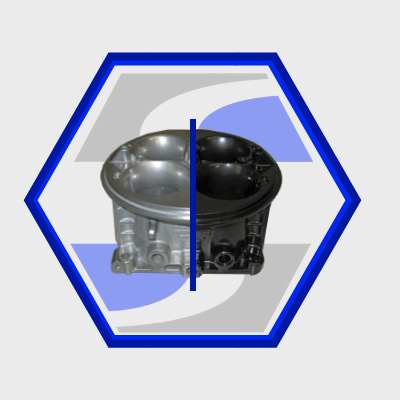Chemical Blacking vs Xylan Black
.png)

.png)
When it comes to producing an aesthetically pleasing matte black finish, the range of options can be quite confusing. Two of the most popular of these processes are Chemical Blacking and Xylan coating, but which process sis better for which situation?
What is Chemical Blacking?
Chemical Blacking is a process suitable for Carbon Steels, Stainless Steels and Brass Alloys. It is a conversion coating in which the surface of the metal part reacts with chemicals and salts in the vat to produce a thin coating with a black, matte finish.
What is Xylan?
Xylan is a brand name of a range of different coatings, each of which has been formulated with a different application. Xylan 1052 for example is used to prevent wear on mating surfaces and Xylan 1400 is formulated for corrosion resistance. It is available in a range of colours which includes Black which will often have a slightly glossy appearance.
Thickness
One of the main advantages with Chemical Blacking is it has a very negligible impact on the surface thickness of a part. This is because the process converts the surface as opposed to adding a layer onto it. This makes it ideal for small and intricate components with critical dimensions. Xylan on the other hand is a coating which is sprayed onto the surface and is usually between 10-30 microns thick, so may not be suitable for critical dimensions.
Corrosion Resistance
Chemical Blacking will improve the corrosion resistance of a component as it helps encapsulate it from its environment and this can be improved with the addition of waxes and oils, in particular chemical blacking can handle environments with high amounts of moisture. Where you are blacking a Stainless Steel component, there will be very little in the way or additional corrosion resistance. Xylan’s corrosion resistance will depend on the formulation you use, Xylan 1400 is a thick film coating that resists acid rain, weathering and high temperature. We often get enquires for components that need to function in an outdoor environment and in this situation we often recommend Xylan to be longer lasting and more durable then chemical blacking.
Wear Resistance
Neither of these options should be selected for higher wear applications. The thin nature of Chemical Blacking means it offers little to nothing in terms of wear resistance and although some formulations of Xylan are specified for wear on mating surfaces this tends to be on components such as bolts and fasteners and not in environments such as mining or slurry pumping.
Applications
Chemical Blacking should be considered for small components with critical dimensions, that aren’t going to be subject to an outdoor environment. For example; Gears, Jigs, Fixtures, Transmission Drives, Steel Rope Wire and Springs.
Xylan should be considered for applications where reducing friction and improving heat and pressure resistance is important. More suitable for components used outdoors and often used on components such as: Threaded Fasteners, Rotors and Anti-Friction Bearings.
Silchrome plating are fully ISO 9001 and 14001 certified and provide both Chemical Blacking and Xylan Coatings. Get in touch today andwe can happily guide you as to which is the right process for your application.




